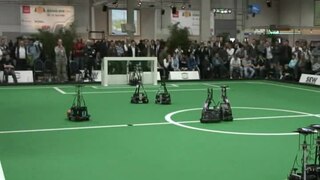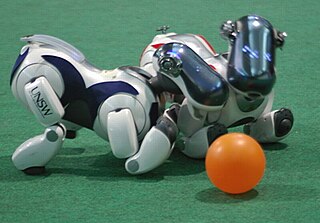
RoboCup is an annual international robotics competition founded in 1996 by a group of university professors. The aim of the competition is to promote robotics and AI research by offering a publicly appealing – but formidable – challenge.
RoboCup Junior (RCJ), sometimes stylised RobocupJunior, is a division of RoboCup, a not-for-profit robotics organisation. It focuses on education and aims to introduce the larger goals of the RoboCup project to primary and secondary school aged children. Participants compete in one of three main leagues: Soccer, Rescue or Dance. Dance Theatre also exists as a sub-league of Dance, and Premier Rescue is part of the competition in Australia and New Zealand.

A robot competition is an event where the abilities and characteristics of robots may be tested and assessed. Usually they have to beat other robots in order to become the best one. Many competitions are for schools but several competitions with professional and hobbyist participants are also arising.

Robot football is a sport organised by the Federation of International Robot-soccer Association. It aims to create a team of robots capable of beating a human side at football by 2050.
The Federation of International Robot-soccer Association [sic] (FIRA) is an international organisation organising competitive soccer - usually 5-a-side - competitions between autonomous robots.

As one of the founding leagues of the international RoboCup initiative, the RoboCup Middle Size League (MSL) robot soccer competition has been organised from 1997 onwards. On an indoor soccer field, with goals of reduced size, teams of five fully autonomous soccer playing robots compete against one another. No human intervention is allowed during a match, except to take robots on or from the field. Although limitations with respect to maximum size and weight are in place, teams are completely free to design both hardware and software.

Women's football in Iran is very popular. Football has been a part of life for Iranians for many decades now and is played in schools, alleys, streets and football clubs nationwide. Women in Iran are increasingly inclined to play football, and with this increasing popularity it is only a matter of time before a more secure infrastructure develops. The Iran women's national football team competes internationally.
The Iranian Volleyball Super League (IVSL) is a professional volleyball league in Iran at the top of the Iranian volleyball league system. It was founded in 1975 as the Pasargad Cup, but after the Iranian Revolution it was renamed to the first Division. In 1997 the league system was revamped and the Iranian Super League was established. Paykan Tehran has won the most titles in the new Super League with 12 titles.
There are a number of competitions and prizes to promote research in artificial intelligence.
The World Robot Olympiad (WRO) is a global robotics competition for young people. The World Robot Olympiad competition uses Lego Mindstorms manufactured by LEGO Education. First held in 2004 in Singapore, it now attracts more than 28,000 teams from more than 85 countries.
Bellarine Secondary College is a multi-campus school on the Bellarine Peninsula, Australia. The college consists of 2 campuses, one in Ocean Grove, and the main campus in Drysdale. The larger and main campus in Drysdale holds the students in years 9, 10, 11 and 12, while the smaller Ocean Grove campus holds the students in Years 7 and 8. The Drysdale campus holds around 1000 approx. students, and the Ocean Grove campus accommodates around 400 students. It has a SEAL class, which means the students are able to do years 7–10 in 3, not 4 years. This also means that students have 3 years to do VCE, not 2.

The RoboCup Standard Platform League (SPL) is one of several leagues within RoboCup, an international competition with autonomous robotic soccer matches as the main event.

The RoboCup Rescue Robot League is an international competition for urban search and rescue robots, in which robots compete to find victims in a simulated earthquake environment. The rescue robot league is run alongside Robocup Rescue Simulation, as part of the RoboCup robot competition.

The RoboCup 3D Simulated Soccer League allows software agents to control humanoid robots to compete against one another in a realistic simulation of the rules and physics of a game of soccer. The platform strives to reproduce the software programming challenges faced when building real physical robots for this purpose. In doing so, it helps research towards the RoboCup Federation's goal of developing a team of fully autonomous humanoid robots that can win against the human world soccer champion team in 2050.
Claude Sammut is a professor of computer science and engineering at the University of New South Wales and Head of the Artificial Intelligence Research Group. He was the UNSW node Director of the ARC Centre of Excellence for Autonomous Systems (CAS), a program manager for the Smart Internet Technology CRC and a member of the joint ARC/NH&MRC project on Thinking Systems.
Islamic Azad University, Qazvin Branch is a private university in Qazvin, Iran.
The 2015–16 Hazfi Cup was the 29th season of the Iranian football knockout competition. Zob Ahan Isfahan was the defending champion. The competition started on 27 August 2015 and the final was played on 29 May 2016.
Zob Ahan won the tournament for the second time in a row after defeating Esteghlal in the final.

NimbRo is the robot competition team of the Autonomous Intelligent Systems group of University of Bonn, Germany. It was founded in 2004 at the University of Freiburg, Germany.

RoboMaster is an annual intercollegiate robot competition held in Shenzhen, Guangdong, China, founded and hosted by the drone tech giant DJI. First started in 2015, it is the brainchild of DJI's founder and CEO Frank Wang, and jointly sponsored by the Communist Youth League Central Committee, the All-China Students' Federation (ACSF) and the Shenzhen City Government. It is the first shooting sport-style robotics competition in China.

Mahmoud Afshardoust is the secretary general of the Iranian Volleyball Federation, a former player and coach of the Iran men's national volleyball team. Afshardoust was invited to the national youth team of Iran in 1991, and in 1993 and 1994 he was the captain of the national youth team. In 1994, he became the most valuable (MVP) youth player in Asia. He was invited to the senior national team in 1995, and was in the senior national team until September 2003, won a silver medal in the 2002 Asian Games, and a bronze medal in the 2003 Asian Championship (China). Afshardoust was the coach of the Iranian national team from 2008 to 2010. He won a silver medal at the 2010 Asian Games in Guangzhou, and a silver medal at the 2009 Asian Championships in the Philippines. He was introduced as the Secretary General of the Volleyball Federation of Iran, and resigned from this position in April 2016.










